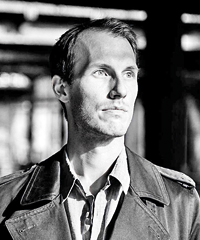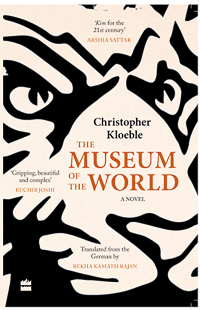Victorian India from a German imagination

C. Kloeble. Pic by Valerie Schmidt
The latest fictional Kimball O’Hara to travel through Victorian India from dusty, teeming Bombay to the Himalayan heights, is a twelve-year-old orphan called Bartholomew. Fresh off the imagination of German author Christopher Kloeble, this youngster leaves an uncongenial colonial orphanage, and uses his wits and linguistic skills (he knows eight languages) to go on an unwitting saga no less than that of Kim and the lama.
It is an unusual work – the first German novel to be published by Harper Collins India, which the author will share and discuss at a reading at the Goethe Institut, Colombo, this Tuesday, December 13 at 7.30 p.m.
Titled The Museum of the World (“Das Museum der Welt”), Kloeble’s book is an adventure (down the Grand Trunk Road and up the sacred mountains) cum historical record cum critique of colonialism. Which is where, points out Kloeble in a Zoom interview with the Sunday Times, his work differs very much from Kipling’s as the ‘Raj’s bard’ was very much convinced of the empire’s glory.
It is all narrated by Bartholomew, quick witted and sharp if without Kim’s physical nimbleness. He is the perfect Indian cockney sparrow (bookish with an insatiable curiosity for knowledge) and, admits Kloeble, what he would have liked to be as a kid.
Growing up, Kloeble was heavy and shy and hated kindergarten, school and the boys’ choir.
 Now slim and engaging, he says he took up writing after his father urged him to write alternative endings to TV series that didn’t culminate quite to his liking – a hobby that grew.
Now slim and engaging, he says he took up writing after his father urged him to write alternative endings to TV series that didn’t culminate quite to his liking – a hobby that grew.
His book is based on the true story of the Schlagintweit brothers whose interpreter Bartholomew is, and who lead him to adventures which trigger avalanches to topple whole empires.
These three scientists, commissioned by the East India Company, and supported by Alexander von Humboldt, led a massive expedition around the time of the Indian Uprising in 1857.
Kloeble’s curiosity was piqued when he first learnt of these three Bavarians who were the Marco Polos of their rather progressive times, though little known today. It also sounded ‘like a movie pitch’ that only two brothers would finally return home.
He would read about them as well as the records they left in thousands of pages – “often boring and not well written” of British India and their own point of view – of the world and especially Victorian South Asia.
They were at the same time progressive noticing how their Anglo-Saxon brethren ‘underestimated the people’ and had no respect for these subjects but also could be racist.
Kloeble says he thought it interesting to depict the three brothers from the ‘natives’’ perspective.
“Because usually these stories are told through (the sahibs’) perspectives. But I wanted to show how it would feel if guys like this come to your place and give you a new name and tell you they know everything better – even though they are not from there.”
No Indophile to begin with, after marrying an Indian, Kloeble and his wife spent half the year in the subcontinent and this gave him background for the novel.
The English translation of his book by Rekha Kamath Rajan places The Museum of the World on a special plinth because, while the German publishing world is quite large, books hardly make their way to other languages. That Rekha had read and loved the book and wanted it translated made all the difference, says Kloeble.
Kloeble has written six books but it is novels he homes in on, mostly family stories because “families form us,” he says, explaining that however we may despise the people we make a menage with, there is no escaping that we end up very much like them – “even if you leave for a different continent, you cannot escape their influence.”
His writing is steeped also in the history of Germany.
“Because I often think – why are things the way they are?”
Consequently, his family novels have the habit of burrowing into ancestral quarters. Once the contemporary part is done, he finds it necessary to go a generation back to explain how things came to be and further back till he finds he has a novel of six generations covering more than a hundred years.
His novels may deal with dark matters but as a raconteur he makes them seem a lot lighter. A regular comment by readers is, “so many bad things happen in this book but still it’s fun to read!”
At the beginning he tries not to think too much and, while he knows where to go at the end, he doesn’t always know what will happen between the beginning and the end.
Mornings were his preferred time to write when he could do it best and enjoy most but “now with two kids that’s not possible so it’s only when there’s time,” he laughs.
Searching for an ideal partner? Find your soul mate on Hitad.lk, Sri Lanka's favourite marriage proposals page. With Hitad.lk matrimonial advertisements you have access to thousands of ads from potential suitors who are looking for someone just like you.


